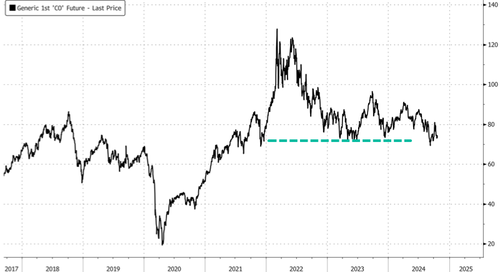Aramco CEO Says China Oil Demand “Bright Spot”
Speaking on the sidelines of the Singapore International Energy Week conference, Saudi Aramco CEO Amin Nasser said he was “fairly bullish” on China’s oil demand, especially after Beijing rolled out a series of stimulus measures to revive the world’s second-largest economy.
“We see more demand for jet fuel and naphtha, especially for liquid-to-chemical projects,” Nasser said on the sidelines, adding, “A lot of it is happening in China mainly because of the growth in chemical needs. Especially for the transition, for the electric vehicles, for the solar panels, they need more chemicals. So that’s huge growth there.”
China, the world’s largest crude oil importer and second-largest oil consumer, is Aramco’s largest crude oil customer. Nasser noted that Aramco plans to increase liquids-to-chemical capacity to 4 million barrels a day, with most of the increase directed at Chinese markets.
“China is a great market. We are investing with our partners,” he said, adding his firm has increased investments in China.
He also noted that the demand for aviation fuel has been a “bright spot” in the country.
In markets, Brent crude prices were up nearly 2% to the mid-point of the $74 handle on mounting risks that Israel launches a counterattack on Iran. Last week, prices fell 7% as China’s slowdown dominated themes.
Nasser pointed out that Asia’s energy transition is occurring much slower than initially anticipated. He said that over decades, the Global South will increase oil demand as living standards rise—and this will eventually be followed by a long plateau.
“Most analysts agree that even when the growth in global oil demand stops at some point, no abrupt drop in overall demand is anticipated, and that stage is likely to be followed by a long plateau,” he said, adding, “Rather than an energy transition, we are really talking about energy addition.”
“If so, more than 100 million barrels per day would realistically still be required by 2050,” he said at the conference.
“This is a stark contrast with those predicting that oil will, or must, fall to just 25 million barrels per day by then. Being short 75 million barrels every day would be devastating for energy security and affordability,” Nasser warned.
He said countries should use a mix of energy sources that push them closer to their climate ambitions, adding, “Our main focus should be on the levers available now.”
In a recent report, the IEA wrote that crude oil demand could slide by the end of the decade because of the “Age of Electricity.”
Despite forecasts of a sharp and sudden plunge in global crude oil demand, that’s not what’s happening. In fact, fossil fuels, particularly natural gas, will continue to power the global economy for decades to come.
Tyler Durden
Mon, 10/21/2024 – 15:25
via ZeroHedge News https://ift.tt/fEoZ41K Tyler Durden

